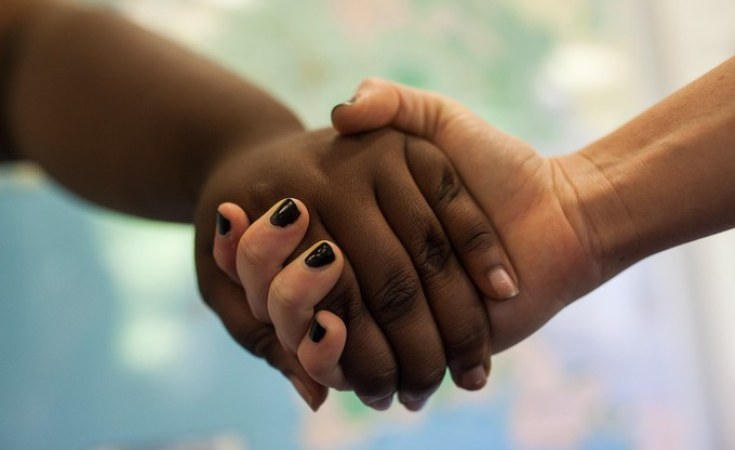THE Supreme Court of Namibia will this month hear two cases regarding spousal rights for non-Namibians in same-sex marriages with Namibian citizens.
This is the first time since 2001 that the court will hear a case in which the focus is on the rights of same-sex couples, and is a pivotal moment for lesbian, gay, bisexual, transgender, queer and intersex (LGBTQI+) rights in Namibia.
The cases involve the foreign spouses of Namibian nationals who are appealing to be granted the same spousal immigration rights as partners in opposite-sex marriages.
Same-sex marriage remains a highly controversial and contentious issue in Namibia. In the two cases to be heard by the Supreme Court, the married couples are not fighting for the legalisation of same-sex marriage, but rather for the recognition of marriages concluded outside the country.
Speaking to The Namibian, a couple involved in one case - German citizen Anita Seiler-Lilles and her Namibian spouse Anette Seiler - said their case was prompted when Seiler-Lilles' application for permanent residence was rejected by Namibia's home affairs and immigration ministry.
"I asked for the reason [...] and we were confused because they said it was because Anita didn't have enough money, which was not true," Seiler explained.
"They later came back to say that the real reason is that our marriage is not recognised and we wondered what our marriage had to do with anything because that is not a criterion for permanent residence," Seiler said.
The couple applied for Seiler-Lilles' permanent residence in 2016 and filed a case in the Windhoek High Court in 2018.
It was around this time that they encountered Daniel Digashu, a South African citizen who is married to Namibian national Johann Potgieter. The two were in a similar predicament.
They married in South Africa in 2015 and moved to Namibia thereafter. However, upon applying for a work permit in the country, Digashu's marital status marred the process.
He has since lived a life in uncertainty, taking his case to court and remaining in the country through visitor's visas.
"It has been a challenge [...] the renewal of the visitor's visa every three months and sometimes you don't get the full three months," Digashu said.
In January 2022, the High Court dismissed the couples' application to have their same-sex marriages recognised in Namibia, stating that it was bound by a previous decision of the Supreme Court in 2001.
In the 2001 judgement, the appeals court stated that domestic law did not recognise same-sex relationships.
In its judgement in January last year, the High Court agreed in principle that LGBTQI+ persons in Namibia have the right not to be discriminated against based on their sexual orientation. The final word on that will have to come from the Supreme Court, though.
Legal Assistance Centre lawyer Dianne Hubbard says these cases involve discrimination against same-sex couples and will establish important jurisprudence for the rights of people in same-sex marriages.
"[The cases] involve recognising marriages validly concluded in other countries for immigration purposes - which is in itself a sign of the changes in the world in the ensuing years, in terms of equality and tolerance - and we certainly hope that Namibia will not be left behind in this regard," she said.
"We should all remember that it was not so long ago that marriages between people of different races were considered to be both immoral and illegal in colonial Namibia. Let us hope that Namibia will learn from its past and leave behind all forms of discrimination," said Hubbard.
She added that the Constitution does not speak specifically on this immigration issue, but does prohibit discrimination and promises that all people are equal under the law.
"It seems that society at large may well be more accepting of differences than political leadership," Hubbard said.
"At the same time, it is also important to remember that the Constitution is particularly important for protecting minorities and people with unpopular views. Parliament expresses the will of the majority, while the Constitution ensures that the rights of all persons are protected and respected."
With only a few days to go until their cases are heard, the couples say they are nervous and anxious as they ready themselves for the fight of their lives.
"I'm very nervous about the whole thing because it's our life that is before court. We don't know what the judges will decide and how our life will go on in the next years," Lilles said.
Adding to that, Digashu said: "I am so overwhelmed I got physically ill a couple of days ago from all the nerves, the anticipation and waiting, and obviously overthinking it as well.
"I am nervous and terrified but also excited because it has been a long, long time coming."
LIVES 'HANGING IN
THE BALANCE'
As they anticipate the impending hearing, the couple says they worry about what will happen if the Supreme Court does not rule in their favour.
For both, this would mean uprooting the lives they have built in Namibia.
"Should we lose, Anita has to leave the country and I have to go with her. We are married and we want to stay together," Seiler said.
"But, I am also Namibian and for me it would be like exile to go to a place where I'm forced to leave my country of birth," she added.
For Digashu and his husband, the prospect of separating or uprooting their family seems inconceivable.
"We've invested so much in our lives here. My fear would be of breaking down our family potentially. It would just bring about uncertainty and chaos, so I'm terrified of that," Digashu said.
The two couples' cases will be heard in the Supreme Court tomorrow.


